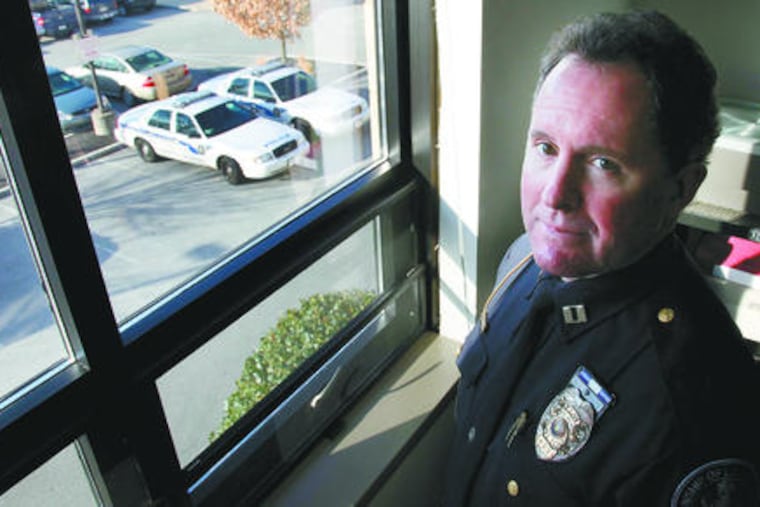Lower Merion police get familiar face as new leader
At 4 p.m. today, a quiet handoff will mark the end of an era in Lower Merion Township. Joseph J. Daly, for 14 years the township's hard-charging public safety superintendent, will turn over the department's top job to Capt. Michael J. McGrath, 52.

At 4 p.m. today, a quiet handoff will mark the end of an era in Lower Merion Township.
Joseph J. Daly, for 14 years the township's hard-charging public safety superintendent, will turn over the department's top job to Capt. Michael J. McGrath, 52.
"It's a great honor," McGrath said Wednesday. "There's a lot of talent in this Police Department. It's a privilege to work with this kind of people, and I don't take it lightly."
McGrath, who has spent 29 years climbing the ranks of the force, was one of two candidates for the job. The other, also from inside the department, backed out for health reasons, officials said.
"There were only two people that were qualified, and one asked not to be considered," said Duncan W. Van Dusen, a member of the Civil Service Commission that monitors police appointments.
Van Dusen said the township had a long tradition of promoting from within. The transition was expected to be seamless because Daly mentored McGrath, police officials said.
"There's a history," said Police Lt. John Dougherty. "Mike worked with the superintendent in many different roles."
McGrath becomes acting superintendent until his formal installation Wednesday by the Police Committee of the township's Board of Commissioners. His salary will be $123,000, said Doug Cleland, township manager.
McGrath is a Philadelphia native. He graduated from Bishop McDevitt High School in Wyncote in 1974, and earned a bachelor's degree in criminal justice from West Chester University four years later. He became a Lower Merion patrolman in 1979.
In 1998, McGrath completed an 11-week course for municipal police officials at the FBI National Academy in Quantico, Va. He learned forensic science, management and leadership skills.
He applied those skills when he returned to the public-safety building in Ardmore, rising from sergeant to lieutenant to captain. He has held the latter rank for the last 10 years.
He said he had done just about every job in the department. "That's the benefit of a good organization," he said.
In the 1990s, McGrath researched and implemented several technology innovations to increase efficiency. They included putting laptop computers in squad cars for electronic report filing and installing cellular modems to let data flow from police headquarters to officers in their cars.
"In fact, the supervisors can monitor reports of their eight to 10 officers right in the field," McGrath said. "This helps us keep more units in the field, where they need to be."
McGrath also installed video cameras in squad cars to record traffic stops and created a special-operations unit with car, bike and plainclothes officers that targets high-crime areas.
Police insiders describe his management style as calm and collaborative; it will need to be because the challenges ahead are daunting.
First, McGrath said, the downturn in the economy will have an effect. Daly has not filled three police vacancies, bringing the roster from 139 to 136. On the street, the downturn means more crime to keep officers busy.
"I don't think we fully know what the impact is on crime trends, but from past history we know that when the price of precious metals goes up, we start to see crime go up."
Over the last six months, spools of copper wire and other metal objects have disappeared from local construction and storage sites.
"We lose spools of copper wire overnight," McGrath said. "Drivers pull up and leave them on Monday, and you come back Tuesday and they're not there."
A second challenge will be to maximize local resources by cooperating with other law-enforcement agencies to combat or solve crime.
A third is to stay ready for acts of terrorism, even when the public's attention lags.
"The farther you get from an incident, the further it gets from people's minds, but you can't forget these things looming in the background," McGrath said.